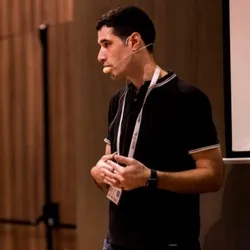
Conferences
All the Fork it! Conferences
Hanoi, Vietnam, 2025
First big project? Keep calm, adapt and learn

Marie Douet
You thought you’d feel quickly comfortable in your first dev job… but what happens when the project is huge and already halfway done?
In this talk, I’ll share what it’s like to join a big ongoing project for the first time, and how to work through it when everything feels out of control. From handling legacy code to managing your imposter syndrome, this talk focuses on real difficulties we all face and tips to overcome them.
You’ll hear honest feedback on how to adapt quickly and find your place in a complex team environment. There are no easy answers or miracles, just lessons learned the hard way, and some good news: you’re not alone.
Invisible Work in Project Delivery - Why You're Always Behind Schedule

Vu Thai Duong
Ever felt like you’re constantly behind schedule, even though you’re coding all day?
In outsourcing environments, delivery delays often aren’t caused by bad code or lazy developers - they’re caused by invisible work. This is the untracked, underestimated, or misunderstood effort that eats away at your timeline: clarifying vague requirements, preparing test data, resolving blockers across time zones, handling last-minute scope creep, endless feedback cycles, or even just waiting on access permissions.
In this talk, we’ll dissect what invisible work looks like in real outsourced software projects. You’ll learn how to spot it early, how to reduce it through better workflows and hand-offs, and how to communicate its impact with clients and stakeholders. Expect real war stories, delivery patterns, and tactical advice to stop being blindsided by things “nobody planned for”.
Because in real life, what kills delivery isn’t the hard work - it’s the hidden work
Montpellier, France, 2025
MCP 4 Data: quand votre AI parle à votre datalake

Roch Dardié
Et si votre AI favorite pouvait interroger directement votre datalake, Lakehouse, Datawarehouse ?
Dans ce quick talk, nous vous présenterons en avant-première les dernières innovations de Hyperfluid : comment le data engineering et la BI se réinventent dans un monde que l’IA redessine en profondeur.
Le système distribué qui a survécu à 1 milliards de séries

Alexandre Burgoni
Dans la plupart des entreprises, Prometheus est la référence en matière de gestion des métriques. Il bénéficie d’une vaste communauté, et ce, en grande partie grâce à la CNCF. Mais que ce soit PromQL (Prometheus Query Language), le format des données ou Prometheus lui-même, il n’est pas parfait. Depuis quelques années, des alternatives ont émergé, promettant des performances améliorées, une meilleure gestion de la montée en charge et une consommation mémoire plus optimisée.
Explorons ensemble un logiciel distribué capable de stocker et de calculer les métriques d’infrastructure de Clever Cloud (>150 millions de séries). Oubliez tout ce que vous savez sur Prometheus et les technologies associées, découvrons ensemble comment nous pouvons gérer autant de métriques tout en garantissant des temps de réponse faibles.
Embarquer votre modèle de machine learning dans votre app ?

Hugo Gresse
Comment exécuter des modèles d’apprentissage automatique sur téléphone ? Comment télécharger le modèle et les données supplémentaires ? Est-ce que cela fonctionne bien ? Même dans une application React Native ?
Pl@ntNet dispose d’un modèle d’identification hors ligne/embarqué qui a été directement créé à partir de notre modèle de production côté serveur. Nous avions besoin de télécharger le modèle, ainsi que les informations et les noms des espèces de plantes que nous ne voulions pas rendre facilement lisibles par d’autres. Mais nous souhaitions également disposer de données supplémentaires telles que des images d’illustration. Nous avons eu quelques problèmes de mise en place, nous allons donc approfondir l’implémentation dans React Native avec un peu de code natif sur Android/iOS (java/swift).
Enfin, est-ce que cela fonctionne bien ? Comment se compare-t-il à notre processus côté serveur ?
Tunis, Tunisia, 2025
How do you learn?

Olivier Huber

Sonyth HUBER
I have not failed. I’ve just found 10,000 ways that won’t work.
We are super passionate and high energy people who love to share our learning journeys at every opportunity. We believe that learning is supposed to be fun. We are passionate about teaching so that people can REALLY understand. Learn how to learn, and you’ll be unstoppable and remember: Simple is beautiful.
Le produit entre la qualité et l'Over-Engineering

Jihène Mejri
Avez vous déjà écrit un code supplémentaire pour recouvrir un besoin future “au cas où” 🤓?
L’over-engineering, est une pratique consistant à développer des solutions excessivement complexes et sophistiquées et qui ne répondent pas forcement aux besoins de l’utilisateur.
Dans le domaine du logiciel, cela se traduit par une focalisation excessive sur la qualité au détriment de la rapidité 🚀.
La sur-ingénierie coûte généralement très cher à l’entreprise :
💸 une augmentation des coûts
⌛ des délais de développement prolongés
🤯 une complexité accrue du système
Pour éviter ce piège ☠️, des exemples et des astuces sont à découvrir dans cette conférence 😉.
How as a game developer, I had to be a marketer, doctor, manager and many more first?

Spoot
Video games are not limited to what the vast majority of people define it to be. Especially as a game developer in a third world country where a lot of development is out sourced. Had the chance to work on so many video games made for purposes other than Entertainment. All kind of serious games in health, education, training and more. Advergames to advertise products and brands and other. I’ll explain to you how I had to go through all of this, before having the opportunity to work on games built for the sake of having fun.
La boite à outils d'un UX/UI Designer Freelance: Défis et solutions

Souhir Mkaouar
Pendant 3 ans, j’ai exercé en tant qu’UX/UI designer freelance, une aventure pleine de défis cachés et d’enseignements précieux. Dans cette intervention, je partage mon expérience personnelle et les outils qui m’ont aidée à surmonter les obstacles du quotidien : de la gestion des projets à la communication avec les clients, en passant par l’organisation de mon travail. Je détaillerai notamment :
- Les difficultés souvent méconnues du freelancing et comment les aborder efficacement.
- Les outils indispensables pour structurer son activité et gagner en productivité.
- Les leçons que j’aurais aimé connaître dès le début de ma carrière indépendante.
Cette session s’adresse à tous ceux qui souhaitent optimiser leur pratique en freelance, qu’ils soient déjà en activité ou envisagent de se lancer.
Insane fast to production using Astro

Elian Van Cutsem
In this talk, we’ll explore building full-stack web applications powered by Astro, Astro Actions and Astro DB. We’ll start by discovering the basics of Astro, why and where it’s useful, and how to build a web applications with it. We’ll discover how to use Astro’s new default hybrid rendering mode to add API routes and dynamic server-side rendering to the application. Then we’ll dive into Astro DB, a simple, yet powerful ORM used to communicate between a LibSQL database and your Astro application. Also, Astro 5.0 has been released, we’ll round up the talk by looking at how we can combine all of these features with a powerful headless CMS like React Bricks.
The Algorithm of Grief: From Loss to Legacy

Mohamed Ali Dridi
Losing my mother to scleroderma redefined my life. Leaving my corporate career to care for her, I built Koyotec while coding through the night. Now, driven by her memory, I return to university to master machine learning. My goal: a classification model for the early detection of scleroderma, helping medicine know at the early stage. I’m exploring various architectures, likely a hybrid approach leveraging both convolutional neural networks (CNNs) for image analysis of potential skin changes and recurrent neural networks (RNNs) to analyze time-series data from patient records. The model will be trained on a carefully curated dataset, focusing on feature engineering to maximize sensitivity and specificity. This is my legacy, transforming grief into a future of hope.
Les listes virtuelles sauveront ton dom

Matthieu Coulon
De nos jours, les navigateurs sont de plus en plus performants et peuvent gérer un volume croissant de données, mais ils ont tout de même leurs limites. Plus le nombre de nœuds dans le DOM augmente, plus il devient difficile pour le navigateur de tout gérer efficacement, ce qui peut rendre l’expérience utilisateur désastreuse.
Dans cette conférence, je vous conterai les aventures d’un développeur front tentant de démêler ces nœuds. À travers un retour d’expérience sur la problématique liée à l’affichage d’un grand volume de données, nous analyserons les solutions mises en place ainsi que leurs limites. (Spoiler: on va parler de virtual list)
How I Ported Doom to the Browser with WebAssembly

Yassine Benabbas
Porting video games allows for the discovery of new technologies while having fun. Additionally, it’s an excellent entry point into the world of video game development. This is especially true thanks to WebAssembly, which simplifies the process of porting games to browsers.
During this session, I’ll share my experiences with my first porting project. I’ll explain why I chose to port Doom. Then, I’ll demonstrate, step by step, how I successfully integrated the browser Canvas and AudioContext in JavaScript to achieve rendering that can reach up to 60 fps.
By the end of this conference, you’ll see video game porting in a new light. So, if you’re passionate about video games or wish to explore how WASM contributes to game porting, this session is for you.
Bridging, Compiling, and Rendering: How Cross-Platform Frameworks Work

Mohamed Rejeb
Cross-platform frameworks like React Native, Flutter, and Kotlin Multiplatform promise native-like experiences with shared codebases—but how do they actually achieve this? This talk dives into the core mechanisms behind these technologies, exploring how they bridge to native code, compile across platforms, and render UI efficiently. By understanding their inner workings, developers can make informed choices when selecting the right framework for their next project.
Ce que tout développeur Spring doit savoir : Pièges courants et techniques d'efficacité

Atef Maddouri
J’ai souvent rencontré les mêmes mauvaises pratiques qui transforment peu à peu une application en un véritable cauchemar : fuites de mémoire, requêtes SQL inefficaces, et code difficile à maintenir. dans mon talk, je partagerai avec vous ces erreurs courantes et vous montrerai comment les éviter pour ne pas finir avec une usine à gaz.
Let's discover together the next generation of observability with logs and traces: Quickwit

Idriss Neumann
Today, in cloud-native projects, an observability stack is systematically in place. There are many such stacks (Elasticstack, Graylog, Grafana…). All those stacks, except for SaaS solutions like Datadog, rely on two solutions for log storage and search: Elasticsearch or Grafana Loki.
Both solutions have their pros and cons: on one hand, Elasticsearch is based on a very powerful search engine (Apache Lucene) but consumes a significant amount of resources to maintain performant indexes. It requires a primary node and replicas, with all data stored on block storage (SSD), which can become excessively expensive. On the other hand, Loki is very fast at ingestion and less costly because it stores logs on object storage but lacks the indexing power of Elasticsearch, making searches often slow and complex.
In this presentation, we’ll present Quickwit which combines the best of both worlds. We’ll explain how it achieves this by rewriting a search engine comparable to Lucene with high performance and leveraging the gains to store indexed data in object storage.
We’ll also see in this presentation that Quickwit can serve as a backend for storing traces via OpenTelemetry and is compatible with Jaeger UI, allowing traces to be stored durably over time.
This presentation will include a demo where Quickwit will ingest logs and traces from a Python application via OTLP/grpc. We’ll showcase dashboards with the Grafana plugin, enabling the correlation of logs and traces
Tunis, Tunisia, 2025
Creating engaging animations with React Native

Omar Borji
React Native permet aujourd’hui de créer facilement des animations fluides et élégantes, améliorant l’expérience utilisateur et rendant les applications plus attractives. Dans cette conférence, nous explorerons plusieurs types d’animations simples à développer et à intégrer dans vos projets.
3D, animation and design

Ahmed Ben Jbara
A talk exploring the world of 3D, animation, and computer-generated visual design. Attendees will gain insight into what 3D is, its diverse applications, and how it shapes industries. The session will also highlight various opportunities for monetizing 3D skills and turning creativity into income
Bangkok, Thailand, 2025
Navigating and Redesigning Payment Systems for Global Connection

Adaku Nwakanma
Global payment systems are intended to connect us all, yet they often overlook the unique challenges faced by people in underserved economies. This talk dives into the creative ways Nigerians navigate and design payment solutions when major platforms fail to address local realities. For freelancers and entrepreneurs from Nigeria and other similar socioeconomic contexts, accessing international clients or services isn’t always straightforward. Traditional payment systems can be restrictive, making it difficult to send or receive funds, and global platforms often lack support for local currencies, banking structures, and reliable access.
I will share insights from my personal experience as a freelancer from Nigeria, covering both the challenges and the ingenious, often community-driven solutions Nigerians have developed to thrive financially. From mobile banking innovations and peer-to-peer transactions to informal digital networks, these strategies reflect a deep cultural and technological adaptability.
By examining how people work around these gaps, this talk will offer practical takeaways for designers and developers aiming to create more flexible and inclusive financial tools. Attendees will gain a deeper understanding of the resilience in these communities and learn how to incorporate similar adaptability, inclusivity, and human-centred thinking into global design solutions for payment systems.
Behind the Screens: Hacker Tactics to Steal Your Data

Nicolas Striebig
Step into the intriguing world of hackers and uncover the techniques they use to access personal and sensitive information. Explore their methods, understand the risks and learn how to protect yourself in today’s digital landscape.